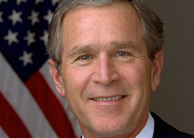Years of Tumult: Retrospective Analyses of the George W. Bush PresidencyINTRODUCTIONTwenty-eight Northeastern students in a course called Political Science Senior Capstone spent the spring semester of 2010 exploring the major areas of research and scholarship in political science by focusing on the presidency of George W. Bush. The works of scholars in the discipline’s subfields of American government and politics, presidency studies, public policy, public law, campaigns and elections, media and public opinion, international relations, and foreign policy... Table of ContentsI: Economic PolicyII: Compassionate Conservatism and Domestic Policy
III: Media, Elections and the Politicization of Governing
IV: Law and Politics
V: Bush's Anti-Terrorism Policies
VI: Foreign Policy and International RelationsInquiries Journal provides undergraduate and graduate students around the world a platform for the wide dissemination of academic work over a range of core disciplines. Representing the work of students from hundreds of institutions around the globe, Inquiries Journal's large database of academic articles is completely free. Learn more | Blog | Submit Expedited Article ReviewSubmit an article to Student Pulse and get an answer in 10-days Submit an article and get a decision fast. If you need a fast decision, INQUIRIES Journal offers expedited processing of your submission for a small fee. Depending on the expedited review option you choose, you can receive a decision in as few as 5-days. In addition to a shorter review period, the fee supports the journal's continued operation and open-access publishing model. Standard submissions are always free. Submit Now » - Submit an Article to Student Pulse -Twenty-eight Northeastern students in a course called Political Science Senior Capstone spent the spring semester of 2010 exploring the major areas of research and scholarship in political science by focusing on the presidency of George W. Bush. The works of scholars in the discipline’s subfields of American government and politics, presidency studies, public policy, public law, campaigns and elections, media and public opinion, international relations, and foreign policy were examined with the aim of discerning how political scientists today approach and explain a wide variety of events and issues during President Bush’s two terms in office. These students were then given an opportunity to research and write their own study of some aspect of the Bush presidency. The fruits of this research are collected here in this volume, edited by Nicole Wilkins and Chris Federici, two students selected by their peers for this task.
I had the distinct pleasure of working with these students in this course. Since we examined and discussed many topics that were outside of my area of specialization, I must confess that there were times when the students probably had more expertise on a subject than their professor. I continue to be amazed by how much learning and insight these students have gained during the short time they spent studying political science at Northeastern University. I certainly have my colleagues in Political Science and throughout the university to thank for their jobs well done. Thanks also to our coop coordinators (Bill Wray and Kari von Knoblock) who made sure that our political science majors were getting the most out of their experiential education opportunities. I also wish to thank John Ellis, President Bush’s first cousin, who came to Northeastern University on March 11, 2010, and presented a lecture on decision making in the Bush White House. His unique insider’s perspective helped us to understand better the decision to go to war with Iraq in March 2003. We are indeed grateful for his willingness to travel to Boston and share his views with us. In April 2010, the students presented their original works in a conference at Northeastern University titled “Retrospective Analyses of the George W. Bush Presidency.” Thanks to Barbara Chin in the political science office for all her help in organizing this event. I have saved for last special thanks to all twenty-eight students. They worked hard throughout the semester in an effort to understand more fully the legacy of the president who was in office at the time they commenced their studies in political science. Most of these students were preparing their college applications when President Bush in November 2004 won reelection, and most began as freshmen in the fall of 2005 when criticism mounted over the Bush Administration’s handling of Hurricane Katrina and the insurgency in Iraq. Since they ‘came of age’ during the second half of the Bush years, it makes sense for them now to show what they have learned by focusing on some aspect of the Bush presidency. —Professor Michael Tolley, Department of Political Science, Northeastern University — April 2010 |



